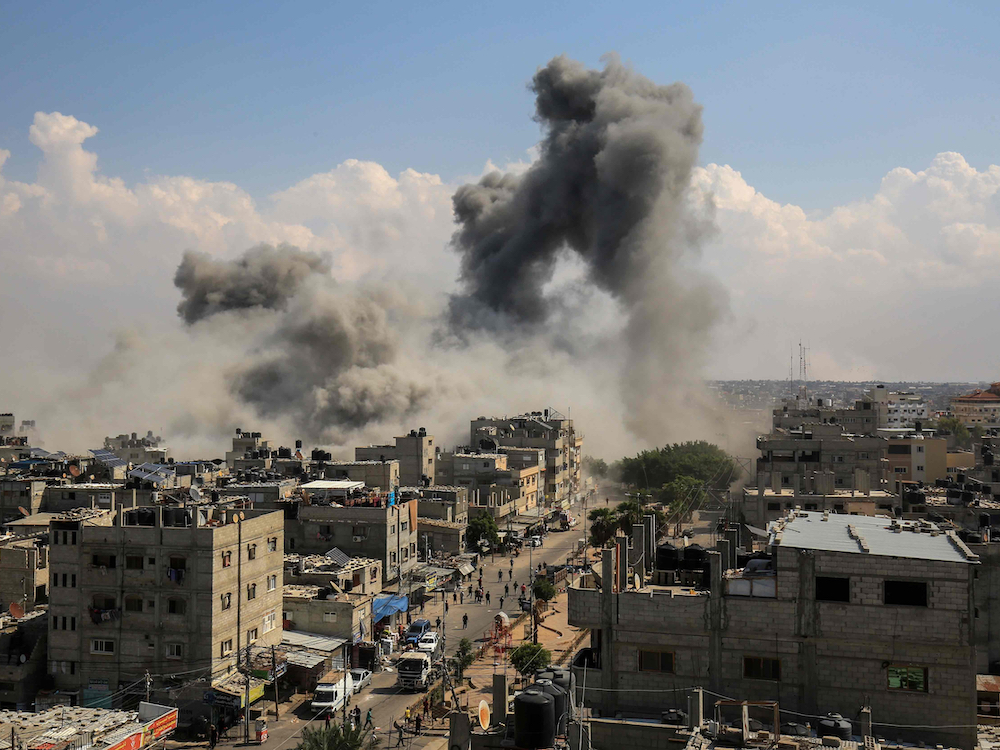The ancient military philosopher Sun Tzu advises war makers to win the war before they fight it. That is, they must analyze the enemy’s strengths and weaknesses, and devise means to neutralize the strengths and exploit the weaknesses. Allies will provide strength, perhaps even enough to deter the enemy from fighting at all — the sweetest victory of all.
The Oct. 7 attack on Israel by Hamas seems to flout Sun Tzu’s wisdom. It was a surprise attack against a far more powerful enemy, deliberately intended to kill or kidnap innocent civilians. The two million Palestinians trapped in the Gaza Strip were instantly at least as vulnerable as the Israelis attacked on Oct. 7. The civilians, half of them children, have nowhere to go, and Hamas itself can’t really defend them when Israel has cut off food, water, electricity, fuel, internet and medical supplies. On the night of Oct. 27 through Oct. 28, land forces from Israel punched deep into north Gaza while bombarding the rest of the strip and cutting the whole strip’s access to the internet. It must have been a very long, very dark night.
But Hamas may have adapted the wisdom of Sun Tzu to its particular situation. Their attack required a careful analysis of Israel and its allies, and a cold-blooded willingness to suffer both huge civilian losses and international condemnation. But to Hamas, such losses would be the price of victory.
So Hamas saw in Benjamin Netanyahu a lazy and corrupt politician who thought Gaza could be sealed off and politically isolated from the Palestinians in the West Bank, who were steadily losing their land and homes to Israeli settlers. Just to stay in power, Netanyahu had formed the most far-right government in Israel’s history, triggering six months of street demonstrations, bitter disputes between ordinary citizens of Israel and even a “cold civil war.”
Hamas also saw some of its Arab neighbours starting to make their peace with Israel. Saudi Arabia was about to establish normal relations, along with other Gulf states. Iran has long supported both Hamas and Hezbollah, which threatens Israel from southern Lebanon; it might well step back from an Arab-supported Israel. If Israel actually did settle relations with its neighbours, it would be at the Palestinians’ expense.
Months of open preparation, including training with wall-hopping light aircraft, must have encouraged Hamas, because Israel seemed not to notice. If anyone involved with Israel’s intelligence agencies did warn Netanyahu, it was in vain.
Hamas knew perfectly well it would be condemned around the world, with good reason, as arch-terrorists. But Hamas fighters went into southern Israel and murdered young people at a music festival, families in their homes and the few surprised Israeli soldiers actually on the ground. They took babies and old women hostage and sequestered them in Gaza’s vast tunnel system.
“Terrorism,” however, is an overused term. Hitler started the Second World War under the guise of an anti-terrorist attack on Poland. Stalin shot and starved millions charged with terrorism in Ukraine.
The late Robert Fisk, who covered the Middle East for decades, considered it an empty word. In his 1990 book Pity the Nation: Lebanon at War, he wrote:
But "terrorism" no longer means terrorism. It is not a definition; it is a political contrivance. "Terrorists" are those who use violence against the side that is using the word. The only terrorists whom Israel acknowledges are those who oppose Israel. The only terrorists the United States acknowledges are those who oppose the United States or their allies. The only terrorists Palestinians acknowledge — for they too use the word — are those opposed to the Palestinians.
To adopt the word means that we have taken a side in the Middle East, not between right and wrong, good and evil, David and Goliath, but with one set of combatants against the other. For journalists in the Middle East, the use of the word "terrorism" is akin to carrying a gun. Unless the word is used about all acts of terrorism — which it is not — then its employment turns the reporter into a participant in the war. He becomes a belligerent. In Lebanon, it also means the journalist believes that the immensely powerful armies and militias in the country can be divided into "good guys" and "bad guys". They cannot; in Lebanon, they are all bad.
No good guys
If Robert Fisk were alive today, he would see no good guys in either Gaza or Israel, and I would not be surprised if he were to describe Oct. 7 as a classic provocation: Hamas intended its attack to be so appallingly cruel that it would provoke the Israeli government into even worse reprisals, thereby revealing its true nature as oppressor rather than victim.
As the Americans eventually learned after 9/11, wars of rage and revenge, of “good” against “evil,” never turn out well. Netanyahu instantly looked incompetent, incapable of maintaining the intelligence and security systems that would have seen Hamas’s preparations and snuffed them out. U.S. President Joe Biden went out of his way to warn Israel against too angry a response, but Netanyahu had nothing but anger to compensate for his failures.
Hamas must have understood something else: diasporas are everywhere, in almost every country, and they often maintain close ties with their homelands. The Palestinian diaspora is almost twice the number of Palestinians living in the West Bank and Gaza. A quarter of a million of them live in the U.S., 500,000 in Chile, almost 50,000 in Canada.
Intensifying antisemitism and Islamophobia
So Israel’s allies might swear to have its back, but many of the allies’ own citizens marched in the streets to support Gaza. Worse yet, the attack on Gaza provided a pretext for the intensification of the antisemitism that has thrived in far-right populist parties including the U.S. Republican party — and worldwide.
Islamophobia is growing too. Canada has 1.8 million Muslims, who must now feel as insecure as their 335,000 Jewish neighbours. Our 45,000 Palestinian Canadians include Muslims, Christians, Druze and Baha'i.
Finding ourselves divided has been worse than unsettling. In countries that boast of their freedom of speech, people have lost their jobs for expressing the wrong opinion. Others talk themselves into extreme positions they will soon regret. And still others wish a plague on both their houses, when what both houses need is a blessing.
If western countries are divided against themselves, the nations of the Middle East are being dragged into an uncomfortable unity. Turkey’s President Recep Tayyip Erdoğan had been trying to broker the release of hostages; but when he spoke on the weekend at a “Great Palestine Rally” at Istanbul Airport, he said: “Israel, we will declare you to the world as a war criminal.”
The Saudi Gazette reported that Saudi Foreign Minister Prince Faisal bin Farhan “conducted multiple calls with Arab counterparts, including those from Jordan, Morocco, and Egypt,” trying to orchestrate “collective efforts to halt military escalation, prevent forced displacement of Gaza citizens, and engage the international community in providing consistent relief aid and medical assistances.”
The failure of such efforts, of course, could lead to a much wider war as Israel’s neighbours are pulled into the conflict. From the viewpoint of Hamas, such an event would be the cavalry riding to the rescue, opening up a multi-front war that the U.S. and NATO could also feel bound to join.
More likely, Hamas might expect the U.S. and NATO to put intense pressure on Netanyahu to accept a genuine ceasefire, probably with an exchange of hostages for the 5,000 Palestinians currently in Israeli prisons. Sun Tzu might not call it a victory, but Hamas would see it as progress in a century-long war.
Time for a 'humanitarian pause'
But perhaps the combatants and their allies could take a “humanitarian pause” to reconsider the situation history has imposed on them.
Even before the First World War had ended, France and Britain established the secret Sykes-Picot Agreement that gave Palestine to the British. In 1917, Britain issued the Balfour Declaration, calling for a Jewish “national home” that would somehow not inconvenience the home’s current residents. The European empires had often persecuted Jewish people, but now they could form a convenient client state at the expense of no one but the Palestinians. Both France and Britain set up puppet governments and artificial kingdoms like Syria, Lebanon, Jordan and Iraq. A century of misery has followed.
If European empires could redraw the map of the Middle East 100 years ago, perhaps the peoples of the region could do it again, for themselves — not to maintain some advantage over one another, but to save themselves from an even worse catastrophe than the present one. A new effort toward self-determination would require a multi-state solution, with Israel as one of those states and Palestine as another.
The Israeli settlers in the West Bank would move back inside Israel’s 1967 borders, with a guarantee by neighbouring states that any attack on Israel would be considered an attack on all of them. The new state of Palestine might include part or all of Jordan, and perhaps parts of Lebanon or Syria. An independent Kurdistan might even be possible. Gaza rebuilt might be a city state like Singapore, or simply a Palestinian enclave giving the new nation access to the sea.
Of course such speculation sounds impossible. So does the continuation of the status quo post-1967. If nothing else, Israel alone amid enemies will be gravely unprepared for the heat, drought and disastrous floods that climate change is already bringing to the region. Working together, Israel and its neighbours might be able to future-proof their existence against far worse threats than Hamas.
And Hamas itself? Its leaders should stand in the dock at The Hague and be tried for war crimes — along with many members of the present Israeli government. Provoking the Israelis into committing war crimes was itself a war crime and should be judged as such. Sun Tzu would think both sides were getting off lightly. ![]()
Read more: Rights + Justice, Politics

















Tyee Commenting Guidelines
Comments that violate guidelines risk being deleted, and violations may result in a temporary or permanent user ban. Maintain the spirit of good conversation to stay in the discussion and be patient with moderators. Comments are reviewed regularly but not in real time.
Do:
Do not: